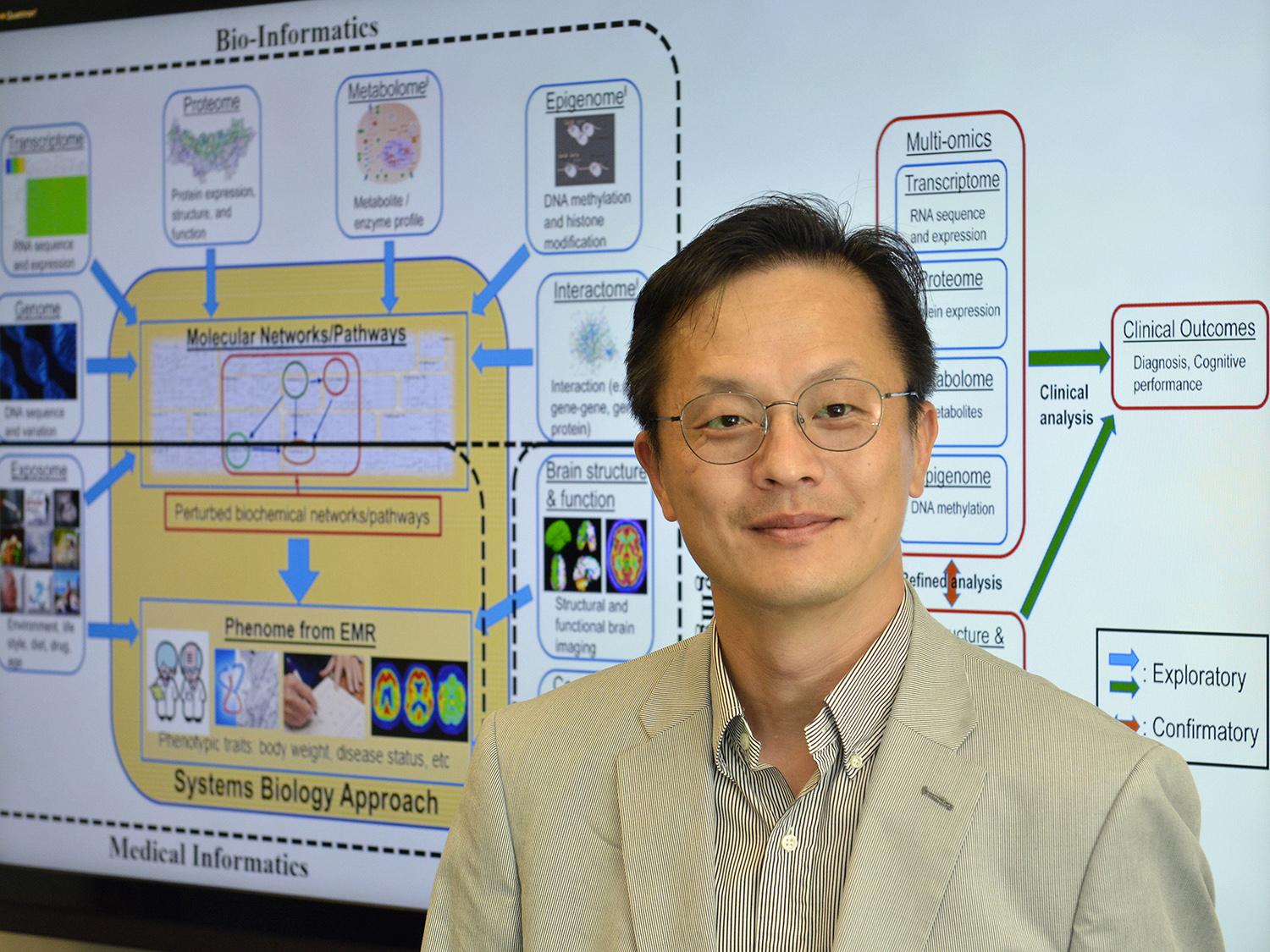Dedication to researching complicated neurological disorders and an impressive publication record have earned Sungeun Kim of the electrical and computer engineering faculty the Provost’s Award for Scholarly and Creative Activity.
Nominator and fellow electrical and computer engineering faculty member Marianne Hromalik noted that, since Kim started at SUNY Oswego in 2016, he “has sustained, in addition to his teaching and administrative duties, an impressive record of cutting-edge research.”
Kim’s primary research includes “innovative methods for detecting blood-based biomarkers for Alzheimer’s as well as the integration of the analysis of multiple ‘omics’ (proteomics, genomics, transcriptomics, etc.) data with neural imaging and clinical data to allow for early detection of Alzheimer’s and other complex diseases,” Hromalik wrote. “This work not only represents rapidly expanding research at the very edge of discovery but also has significant medical and social value.”
Hromalik praised his track record of peer-reviewed publications -- 93 in all, 21 since joining the Oswego faculty -- as well as his 11 peer-reviewed conference presentations. Kim, who earned his Ph.D. from Purdue University’s School of Electrical and Computer Engineering, has published two pieces in the prestigious journal Nature, and serves as a peer reviewer for several well-regarded academic journals as well.
“Particularly since arrival at Oswego, he has constantly produced outstanding research work demonstrating an extreme productivity in publishing peer-reviewed work and obtaining external funding,” wrote ECE faculty member Adrian Ieta. “He won three external grants in the area of Alzheimer’s disease and Parkinson’s disease.”
Ieta also credited Kim involving Oswego undergraduate students in his research, exposing them to this vital research area, as well as providing “instrumental” work supporting the college engineering programs earning sought-after ABET accreditation in 2019.
‘Ready to help’
“Sungeun is a great colleague, always ready to help, to take up new challenges related to teaching, research or other tasks,” Ieta wrote. “He has an amazing ability to redefine himself and adjust to objectives and requirements. His teaching performance in introductory and advanced courses is excellent.”
Kim has provided additional service to the department and its students by revitalizing ECE’s capstone design proposal and capstone design courses and has “imparted many of his excellent research techniques” to seniors in reorganizing and redesigning their project planning processes, Hromalik said.
“Dr. Kim’s ground breaking research … has provided deep understanding of mechanistic insights into the molecular basis of brain disorders and identification of new potential therapeutic targets and diagnostic/biomarker strategies,” wrote research colleague Kwangsik Nho of Indiana University’s Center for Neuroimaging.
“He is an excellent researcher and an expert on mechanisms of neurodegenerative disorders such as Alzheimer’s disease at cellular, molecular and systems levels,” Nho added. “I have never seen anyone develop complex analytic paradigms and statistical/computational approaches and apply them to highly complex data sets as quickly as Dr. Kim.”
“I am highly impressed by his research accomplishments at your institution,” wrote Li Shen, a professor of informatics and Senior Fellow at the Penn Institute for Biomedical Informatics at the University of Pennsylvania.
“He is one of the few people I know that has published consistently in imaging, genetics, computing, neuroscience and disease-specific journals,” Shen added. “This very clearly demonstrates that he is multidisciplinary. This is a highly desirable trait in a world of modern research and teaching that thrives of the use of multiple disciplines to solve complex problems.”
The Provost’s Award for Scholarly and Creative Activity is designed as recognition of a significant accomplishment in scholarly or creative activity within one’s field of study.




